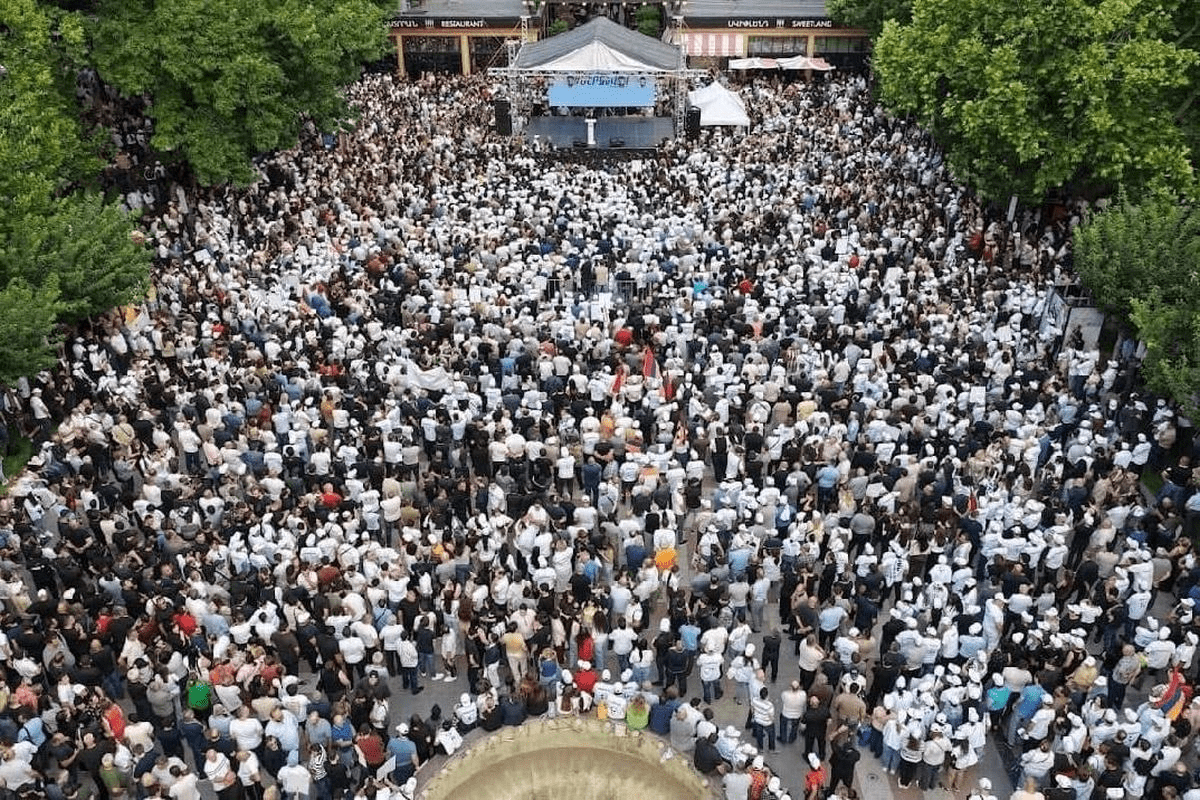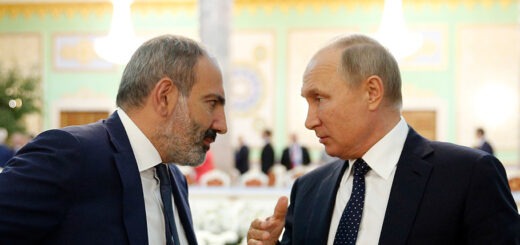Russian-Armenian Billionaire’s Empire Under Siege

by Arshaluys BarseghyanTransitions, Czech RepublicSamvel Karapetyan’s backing for conservative clerics accused of plotting a coup landed him in hot water with Armenian authorities. From OC Media.The Russian-Armenian tycoon Samvel Karapetyan is one of the richest people in Armenia. His estimated wealth of $4.4 billion amounts to around half of the country’s entire public budget. For decades, Karapetyan has remained largely outside politics, instead gaining recognition for his business empire and as a benefactor who sponsored the renovation of the Etchmiadzin Cathedral, Armenia’s oldest and most important church.
In June, that all changed when the 60-year-old stepped into the middle of a bitter feud between Prime Minister Nikol Pashinyan and his government and the Armenian Apostolic Church.
“If the politicians fail, then we will participate in our own way in all of this,” Karapetyan told News.am on 17 June in defense of the church. Hours later, Karapetyan was behind bars, charged with calling for the usurpation of power following a dramatic raid on his mansion in Yerevan.
Since then, the authorities have moved on the billionaire’s significant holdings, raiding his businesses, attempting to nationalize the country’s energy network, which Karapetyan controls, and shutting down his pizza restaurants on health and safety grounds.
Karapetyan’s name also appeared as a possible asset to be used by an alleged coup spearheaded by the now-detained Archbishop Bagrat Galstanyan.
Karapetyan has fought back, challenging the attempts at nationalization at an international tribunal and suing government officials for defamation.
But as the billionaire remains in prison awaiting trial, can his empire survive his showdown with Pashinyan?
The Arrest
Karapetyan appeared to wade into politics when he spoke out in defense of the Armenian Church. For months, Pashinyan and other officials had been locked in an increasingly vulgar war of words with the institution (a week after Karapetyan’s arrest, Pashinyan offered to show his penis to the head of the church).
“What opinion should I have,” Karapetyan asked, “when a small group, forgetting Armenian history and the thousands of years of the Armenian Church’s history, has attacked the Armenian Church and the Armenian people?
“Since I have always stood by the Armenian Church and the Armenian people, I will become directly involved. If the politicians fail, then we will participate in our own way in all of this,” Karapetyan said in his now infamous interview.
The statement quickly went viral. As it did so, Pashinyan hit out in a series of social media posts insulting both the church and Karapetyan, vowing to “deactivate them again. And forever.”
As the searches were underway at Karapetyan’s mansion, Pashinyan made several other posts, in which he quoted Karapetyan’s remarks in the interview, responding with, “Now I will meddle with you in my own way.”
The Attack on Karapetyan’s Empire
Pashinyan’s threats did not appear to be empty. Since his arrest, authorities have raided, inspected, or threatened to nationalize several of Karapetyan’s businesses, though they have denied that these actions were politically motivated or connected to his arrest. Karapetyan himself has also faced a second set of charges, for money laundering, which his lawyers have dismissed as “obviously unfounded.”
The most significant are the moves against Electric Networks of Armenia (ENA), run by Karapetyan’s Tashir Group, which runs most of the country’s electricity distribution network.
While doubling down on his support for the church as he was led out of his home by police on the night of 17 June, Karapetyan insisted he did not “give a damn” about the Armenian authorities “or their electricity network.”
In response, Pashinyan vowed to “swiftly” nationalize ENA, but maintained that this was not related to Karapetyan’s statements.
A day later, Armenia fined ENA 10 million drams (22,500 euros) “for technical and commercial violations.”
On 3 July, the parliament adopted amendments that would allow the state to “intervene” and take over the administration of ENA should it fail to meet its obligations.
On 8 July, the authorities raided ENA’s headquarters, along with the home of the company’s chair and Karapetyan’s nephew, Narek Karapetyan.
Following the raids, the Investigative Committee released two statements on 8 July: one noted that they had conducted “simultaneous searches” at roughly 20 locations, as part of which they obtained evidences that Karapetyan’s supporters had “coerced and materially incentivized” people to participate in a rally in support of Karapetyan on 4 July in Yerevan. After this, the Investigative Committee launched criminal proceedings against three unnamed individuals.
The second statement said simultaneous searches had been conducted at a total of 51 addresses as part of another criminal case against representatives of several unnamed companies. It said the case involved “large-scale embezzlement by fraud, particularly large-scale money laundering, as well as particularly large-scale tax evasion.” Criminal prosecutions were brought against 11 people in this case, with five remanded into pre-trial custody.
On 18 July, the chair of the Public Services Regulatory Commission, Mesrop Mesropyan, appointed Romanos Petrosyan as temporary manager of ENA. Petrosyan is a prominent member of the ruling Civil Contract party’s board, and has held other positions in Pashinyan’s government.
“At this stage, we, the state, must take over the management of the ENA, and we will take over the management of the ENA,” Pashinyan announced during a press conference the day before Petrosyan’s appointment.
Pizza and Circuses
Several other of Karapetyan’s businesses have also been targeted.
Less than a week before the raids on ENA, on 2 July, law enforcement agencies raided the main office of Karapetyan’s Tashir Group in Yerevan. The raid was carried out as part of a criminal investigation into allegations of “aggravated money laundering, tax evasion, and failure to pay duties or other payments.”
Days after Karapetyan’s arrest, Armenia’s food safety inspection agency said it had conducted inspections of all 30 branches of Tashir Pizza, a popular pizza chain belonging to Karapetyan. Inspectors shut down several branches for “gross violations of sanitary and hygienic standards.”
On 18 June, the inspection body announced that it had suspended production at Tashir Pizza’s dairy production plant in Karapetyan’s hometown of Tashir, citing “violations of sanitary and hygienic norms.”
On the same day as the raid on ENA, the State Property Management Committee sued the Yerevan Circus, also belonging to Karapetyan, demanding it terminate a number of contracts dating back to 2006–2011. The committee said that even though investments were made, the company had failed to fulfill its remaining obligations, such as creating jobs and completing the construction of the circus building.
Karapetyan Fights Back
Arbitration lawsuit: On 22 July, Karapetyan’s defense council announced that the family had won an urgent arbitration case against the government over attempts to nationalize ENA, adding that the decision of the Stockholm-based SCC Arbitration Institute was subject to “mandatory execution” by the government.
The tribunal reportedly applied interim measures prohibiting the government from taking further steps to “seize” the company including refraining from enacting recent legislative amendments aimed at taking over ENA before a full arbitration case could be held.
The government’s response cast doubt over whether they would honor the ruling, a move that could impact investor confidence in the country.
Following this, Armenia’s Justice Minister Srbuhi Galyan announced that the country’s domestic legislation and international conventions allowed the possibility of not enforcing an international arbitration ruling “if it contradicts public order.”
At the end of July, in an interview with CivilNet, Galyan stated that if ENA was nationalized, Karapetyan would be compensated.
On 11 August, the Karapetyan family said they had initiated a full investment arbitration case against Armenia over the “expropriation” of ENA, seeking $500 million compensation for existing and expected damages as a result of the government’s actions.
Defamation lawsuits: Aside from the arbitration case, since 1 July, Karapetyan has filed 15 lawsuits against members of the ruling Civil Contract party and other critics related to defamation or insults, demanding up to 9 million drams in compensation along with public retractions.
Karapetyan in Politics?
Since his arrest, Karapetyan has doubled down on his foray into politics. On 14 July, he announced plans to create a “fundamentally new political force,” adding that the “formation of our political team has begun.” This could pave the way for him to challenge the government in parliamentary elections scheduled for June 2026.
“I have great respect for the political forces and figures who have fought a real struggle against the policy of Nikol Pashinyan’s anti-national government,” he said in a statement, “but we have our vision to build a good future for Armenia. And we will go our own way, with our new team, not excluding domestic cooperation with like-minded people.”
Even before Karapetyan announced his intention to found a new political party, the government appeared to already be moving to block his involvement in politics.
Just under two weeks after his arrest, on 30 June, Pashinyan called for new mechanisms or legislation to limit the political activity of foreign nationals. While not naming Karapetyan directly, Pashinyan said that certain foreign nationals expressed “the most radical views,” such as making calls for the overthrow of constitutional order.
On the same day, Pashinyan touched on “hybrid threats” he said Armenia faced, adding it was necessary to pay “special attention” to the activities of “agents of [foreign] influence.”
Karapetyan reportedly holds both Armenian and Russian citizenship. If true, Karapetyan would already be barred from serving as prime minister under the current rules — the Armenian constitution requires a person to have been solely a citizen of Armenia for the preceding four years for that post.
Three days later, Civil Contract deputies passed a resolution in parliament declaring the “inadmissibility” of usurping power from the state.
Since Karapetyan’s arrest, local authorities in Yerevan have also taken down digital billboards and posters with messages in support of Karapetyan or calling for his release, which were placed near his businesses in the capital.
In an extended press briefing on 17 July, Pashinyan again attacked Karapetyan, threatening to wield the “steel mandate” he said had been given to him by the public if anyone attempted to encroach on Armenia’s independence or statehood.
“What I’m saying, dear colleagues, is that just as you behave in your country of primary citizenship, you should come to Armenia with the same attitude,” he said. “This is not some random place; this is a state. I’ve said that the taste of the state will remain in your mouths. And in such moments, the taste of the state will stay in your mouths for a long time. And I say this as the prime minister of the Republic of Armenia,” Pashinyan said.
A Russian Interest?
Karapetyan’s prosecution has resulted in further tensions in Armenia’s already strained relations with Russia, culminating in Armenia summoning the Russian ambassador.
As the Armenian authorities have attempted to paint Karapetyan as a “Russian agent,” Russia itself responded swiftly to his arrest, considering him a Russian citizen and a prominent figure in Russian business circles.
On the same day as the raids on Karapetyan’s home on 17 June, Russian Foreign Ministry spokesperson Maria Zakharova expressed Russia‘s readiness to provide “necessary assistance” to him. She also labeled the pretext for Karapetyan’s arrest “strange.”
The tensions surrounding Karapetyan’s arrest, despite turning into another occasion for Armenian authorities to voice concerns about the “hybrid threats” posed by Russia, have not developed into a full-scale diplomatic crisis.
[Asked to respond to some officials’ claims of Karapetyan echoing Russia’s threatening statements,] Pashinyan suggested there was “a strong likelihood” that certain circles in Russia and beyond were “behind these hybrid actions and hybrid war” against Armenia. However, speaking at a press briefing on 18 June, he added that he did not believe “such an action could come from the Kremlin or the Russian government.”
Arshaluys Barseghyan is a journalist with OC Media, where this article originally appeared. Transitions has done some editing for length. Republished under a Creative Commons Attribution-NonCommercial 4.0 International License.







